Ernst KRENEK: Complete Piano Concertos, Volume One
The piano concertos of Ernst Krenek (1900–91) are major contributions to the twentieth-century repertoire, comparable to those of Bartók, Prokofiev, Schoenberg and Shostakovich, but astonishingly two of them have never had commercial recordings – an omission this series seeks to redress. Piano Concertos Nos. 1–3, written between 1923 and 1946, show Krenek throwing off the constraints of tonality in favour of a freewheeling, individual use of twelve-tone technique, brimming with colour and often animated with a keen sense of wit.
Mikhail Korzhev
English Symphony Orchestra
Kenneth Woods
Listen To This Recording:
-
Piano Concerto No. 1 in F sharp major, Op. 18
- Moderato –
- Allegro agitato –
- Adagio –
- Allegro moderato (Tempo di Menuetto)
- Andante dolcissimo, celeste –
- Allegro assai, con ferocita –
- Quasi cadenza –
- Canon in der Umkehrung: Adagio, con intimo sentimento –
- Allegretto vivace, molto grazioso e leggiero
- Allegro, con passione –
- Andante sostenuto –
- Poco piu mosso –
- Adagio –
- Vivace
Piano Concerto No. 2, Op. 81
Piano Concerto No. 3, Op. 107:
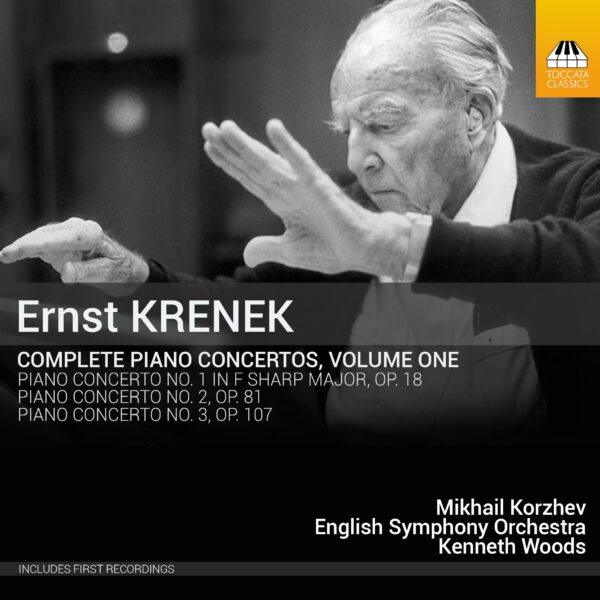
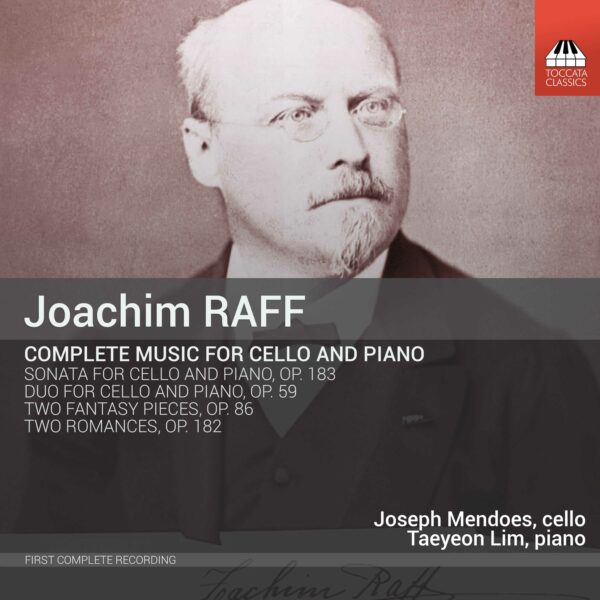
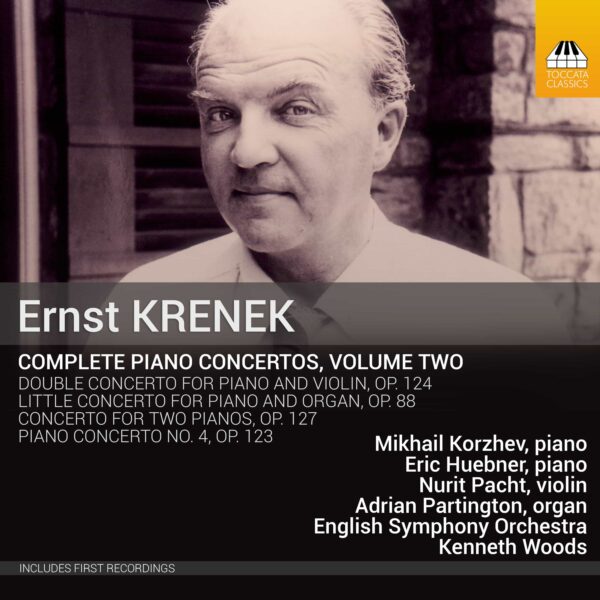
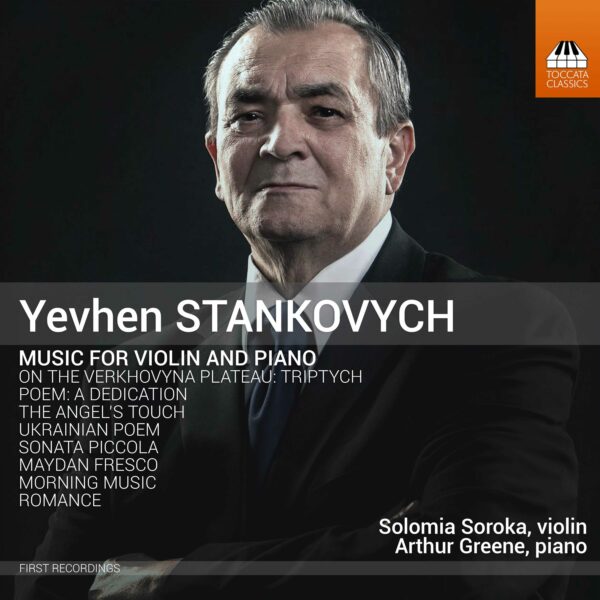
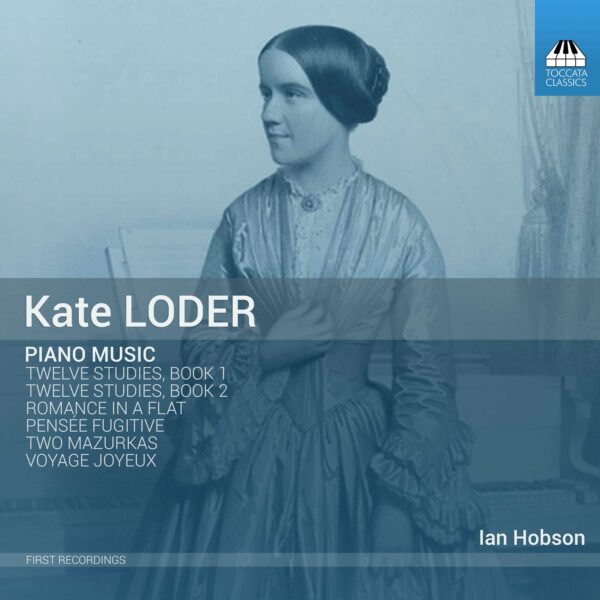
Classical CD Reviews :
‘Yet another fascinating discovery from Toccata Classics. … these piano concertos present another side to the composer. … The first is tonal and Romantic in spirit, although with many sections of dense chromaticism, while the Second and Third are serial. Yet there are as many similarities as differences, particularly in the flowing piano lines and the colourful orchestration, but also the relaxed approach to form and the space Krenek always gives for the often complex relationships between piano and orchestra to play out. The First Concerto was written in 1923. … A small orchestra is used, but to impressive effect, especially the lone trumpet, whose interjections are a defining character of the piece. Connections with Krenek’s later serialism are suggested by the couplings, and come through most strongly in the long and winding, but always clearly focussed, phrase shapes, especially in the orchestra. … Krenek’s approach here [the Second Concerto] was apparently in deliberate opposition to the growing Nazi influence on the arts: It proved to be his last work before leaving Germany for America, where he spent the rest of his life. … [The Third Concerto:] The ominous piano left-hand rumblings with Shostakovich-like horn calls at the opening set the tone. Later we hear some surprising percussion interjections – the snare drum in particular suggesting some narrative subtext beneath this otherwise rigorously abstract music, and the sound of the pianist brushing the strings under the lid adds to the already broad palette of orchestral colours. The performances do full justice to the music. Pianist Mikhail Korzhev is able to make even the most knotty of Krenek’s serial textures flow naturally. His tone is warm, and his phrasing ideally focussed. The orchestra copes well with what must be an unfamiliar idiom. … Ken Woods leads vibrant readings, suitably broad in the First Concerto and suitably atmospheric in the Second. The Third Concerto includes some surprising tempo shifts, often mid-way through phrases, but again, conductor and players always make the results sound natural. Sound quality is good. … Recommended, in the hope that Krenek’s concert music finds the audience it deserves outside of the ranks of modern music historians.’
—Gavin Dixon, Classical CD Reviews
The Sunday Times :
‘RECORD OF THE WEEK: Toccata is known for musical exhumations, but it’s a surprise to find that, as it notes, two of these three piano concertos – the first and second of Krenek’s four – have not been commercially recorded hitherto. No 1 is an attractive tonal work, four movements in a single half-hour span; but No 2, like No 3 inhabits 12-tone territory, and both are the more arresting for that. They, too, join up their movements to make a hectic 20th-century flow of ideas. No. 2 has a canonic adagio that stands out, and the foreshortened (13-minute) No 3 is a witty and mercurial masterpiece. Electric performances all.’
—Paul Driver, The Sunday Times, March 2016
MusicWeb International :
‘Krenek’s First Piano Concerto… delights from its very first, doodling bars. Resolutely tonal it has a warmth and amplitude that, while rooted in a more Romantic age, is no less enjoyable for that. The English Symphony, which began life as the English String Orchestra in 1978, is a very decent band whose alert and sensitive accompaniment is a pleasure to hear. Woods is a model of discretion, allowing Korzhev all the time and space he needs to elaborate on Krenek’s engaging tunes and fleeting baroqueries. … It’s a very distinctive and oddly seductive sound-world, the music economically scored yet always colourful and, at times, surprisingly inward. Korzhev is not a self-aggrandising pianist, so one gets the full measure of Krenek’s imaginative writing. For instance, his light and pensive pianism in the little Adagio is just delightful; … What a terrific start to this programme. Apart from the fine music-making the recording – engineered by Ben Connellan – is full, detailed and well balanced. The concert hall at Wyastone Leys proves as grateful an acoustic as ever, with the listener comfortably ensconced in the best possible seat. Even the dodecaphonic second concerto… comes across with a degree of character and feeling that’s sure to endear it to those who normally fight shy of serialism. … Indeed, those dark, brassy interjections could hardly be voiced with more confidence than they are here. Korzhev is just as clear and communicative in this concerto as he is in the easeful Op. 18 – listen to how well he articulates the central Quasi cadenza – and the ESO play with thrilling focus and trenchancy throughout. … Predictably Korzhev, Woods and the ESO are far more controlled and consistent; for a start they actually make sense of the work [Third Piano Concerto], which is rather more than Mitropoulos and his forces could manage. … Krenek is full of surprises, though; for instance there are moments in the Adagio that could be the accompaniment to an Expressionist silent by Murnau, Lang or Pabst. The prominent harp part is also an unexpected touch; as for the finale it’s both bluff and brilliant. Something of a cliff-hanger, it leaves me impatient to hear more. As a bonus Korzhev and Woods provide additional notes/perspectives on the pieces played. Now if only all booklets were this good.’
—Dan Morgan, MusicWeb International
The Classical Reviewer :
‘[Piano Concerto No. 1:] Mikhail Korzhev provides some buoyant, finely sprung playing moving through quieter passages where the music broadens then hurtles forward in some terrific passages, soloist and orchestra delivering some wonderful playing. … Korzhev captures the playful, yet slightly elusive quality of this music to perfection with Kenneth Woods and the ESO providing some absolutely terrific accompaniment. … There is an exquisitely played gentler moment before the piano brings some firm broad phrases that lead to a surprisingly quiet and gentle coda. This is a quite lovely work in all respects, freely tonal with many lovely ideas. …
[Piano Concerto No. 2:] Though by now he had adopted the 12 tone technique of composition, Krenek‘s use of dodecaphony is not pedantic, allowing him to develop passages of much beauty. … Krenek weaves a remarkably fine orchestral texture around the soloist with moments of sudden drama contrasting with quieter passages where the piano develops the material. … Korzhev brings a tremendous continuity in this fast changing music… the soloist and orchestra show a remarkably fine ensemble. … This is another remarkably fine concerto. …
[Piano Concerto No. 3:] The piano and harp lead forward in a most unusual and inventive passage with percussion adding colour and texture. They move through a faster more dynamic moment before the harp brings a lovely harp passage but it is the piano that leads into the concluding light and joyful Vivace where the orchestra pushes ahead soon joined by the soloist, gaining a terrific rhythm with some very fine orchestration before arriving at the energetic coda. This is an impressive concerto that is full of colour and energy and many distinctive ideas.
I cannot imagine finer performances of these works and with an excellent recording made at the Wyastone Concert Hall, Monmouth, Wales and excellent booklet notes from Peter Tregear, Kenneth Woods and Mikhael Korzhev this is a disc that should win new friends for Krenek’s music.’
—Bruce Reader, The Classical Reviewer
Examiner :
‘What is probably most important, however, is that all three of the concertos on this album are easily accommodating to the inquisitive and attentive listener. Toccata Classics seems to make the case that listening to Krenek should be a journey of discovery; and, from that point of view, both Korzhev and Woods are excellent “guides” for those who commit to making that journey. Whether or not Toccata’s project will eventually lead to a significant “Krenek revival,” the label has definitely established itself as an enthusiastic advocate for the composer, perhaps even as enthusiastic as Krenek was in his personal acts of making music.’
—Stephen Smoliar, Examiner.com, April 2016
The Arts Desk :
‘He’s an important figure, so this disc deserves a warm welcome. Krenek wrote four piano concertos and here are Nos. 1-3, written between 1923 and 1946. No. 1 is tonal though highly chromatic. Orchestrated with dazzlingly clarity, it’s a real find, the brief slow movement wonderfully eerie. The concerto’s close is quietly brilliant, the minuet fizzling out into calm silence. The Concerto No. 2 is completely different: five dark movements written in a highly approachable 12-note idiom, the angst and nostalgia reflecting Krenek’s respect for Berg’s music. Again, there’s a wonderful ending, the disconcerting but deeply satisfying fade to black entirely appropriate for a work written in 1937. Both are superb appetisers for Krenek’s startlingly brilliant Third Concerto, its 13 minutes smarter than many 50-minute symphonies. … Mikhail Korzhev is a heroic soloist, gamely accompanied by Kenneth Wood’s English Symphony Orchestra. Brass and percussion are particularly impressive. And what good sleeve notes: three essays, by music historian, conductor and pianist respectively. Each one a joy to read and full of insight, outlining with erudition and passionate enthusiasm exactly why these pieces demand to be heard. More please.’
—Graham Rickson, The Arts Desk
Gramophone :
‘No 1 (1923) is brashly youthful in some ways – even a bit slapdash – but also has substance, with plenty of boldly projected, rather Hindemith-like harmony and counterpoint. Clear-cut rhythms and melodic shapes signify Krenek’s determination to avoid excessive complexity; and when he adopts the 12 note technique, as in the Second Concerto (1937), his affinity for Schoenberg-like allusions to Baroque textures and Classical forms keeps the music’s feet on firmly communicative ground. Energetically characterful, the more economical Third Concerto (1946) has comparable virtues: the lively interplay of solo and orchestra is the result of designing the work to be directed by a piano-playing conductor. These well-sprung performances benefit from the sharply focused acoustic of the Wyastone Concert Hall. … with a forthright and eloquent soloist in Mikhail Korzhev, there’s no mistaking the edgy fervour of Krenek at his best. Well-judged booklet essays add to this disc’s appeal.’
—Arnold Whittall, Gramophone
Classical Ear :
‘Performances are first-rate: Mikhail Korzhev proves a superbly stylish, fearless and eloquent exponent, and he enjoys admirable support from a hugely spirited English Symphony Orchestra under Kenneth Woods’s unfailingly cogent lead. Both the production and presentation likewise leave nothing to be desired. Do lend an ear to this brave and rewarding issue.’
—Andrew Achenbach, Classical Ear May 2016
Fanfare Magazine :
‘FANFARE WANT LIST: The odd man out is Ernst Krenek, an Austrian composer of great fame prior to the Nazi era, who was denounced as “degenerate” by Goebbels, emigrated to America, and never really recovered his reputation. The Toccata series may change that circumstance in the years to come, with this series of discs of his piano music. This volume includes his first three piano concertos, music of depth and sinew that comfortably stands alongside “modern” piano concertos by Prokofiev and Bartók. Mikhail Korzhev is a superb advocate.’
—Peter Burwasser, Fanfare, November/December 2016
MusicWeb International :
‘Given the rarity of any opportunity to hear Krenek’s music today, it is doubly welcome that both performances and recordings are of the first class. The producer of the disc is Michael Haas, who supervised Decca’s Entartete Musik series which served to introduce so many unknown works from this period to modern audiences; it is marvellous to know that his exploration of this repertoire is continuing to produce such splendid results.’
—Paul Corfield Godfrey, MusicWeb International
Classical Candor :
‘I’m not sure how one should perform the music, my never having heard it before, but I can’t imagine anyone doing it any better than this. Korzhev’s piano playing is scintillating, Woods’s direction is warmly encouraging, and the orchestra is uniformly precise, together giving the score all the interpretive support it could ask for. It’s hard to imagine any other pianist, conductor, or orchestra doing anything more for Krenek’s work. […]
This is modern music for people who don’t usually like the dissonances and peculiarities of much modern music. The extravagance of the Third Concerto sounds particularly appealing in contrast to the relative serenity of the First. The diversity of the three works goes a long way toward illustrating the composer’s musical evolution. […]
From the quiet opening notes to the loudest crescendos, the sound appears smooth, well focused, dynamic, broad, and well extended. The sense of the hall around the orchestra and piano is especially welcome, as the hall’s warm, mildly reverberant acoustic contributes strongly to the disc’s overall realistic effect. The engineer always keeps the piano well integrated with the orchestra, […] What’s more, there is a genuine sense of depth to the ensemble, giving the whole affair a most-natural perspective.’
—John J. Puccio, Classical Candor
International Piano :
‘On the evidence of the first three, magisterially delivery by Korzhev, [the concertos] should rank at least with Prokofiev and Hindemith. […]
Roll on Volume 2! Highly Recommended.’
—Guy Rickards, International Piano, April 2016